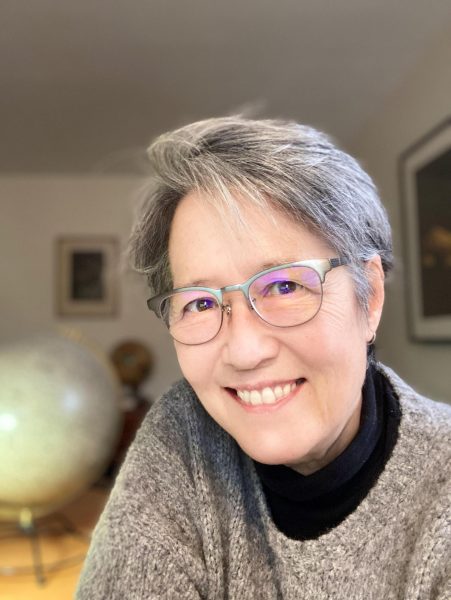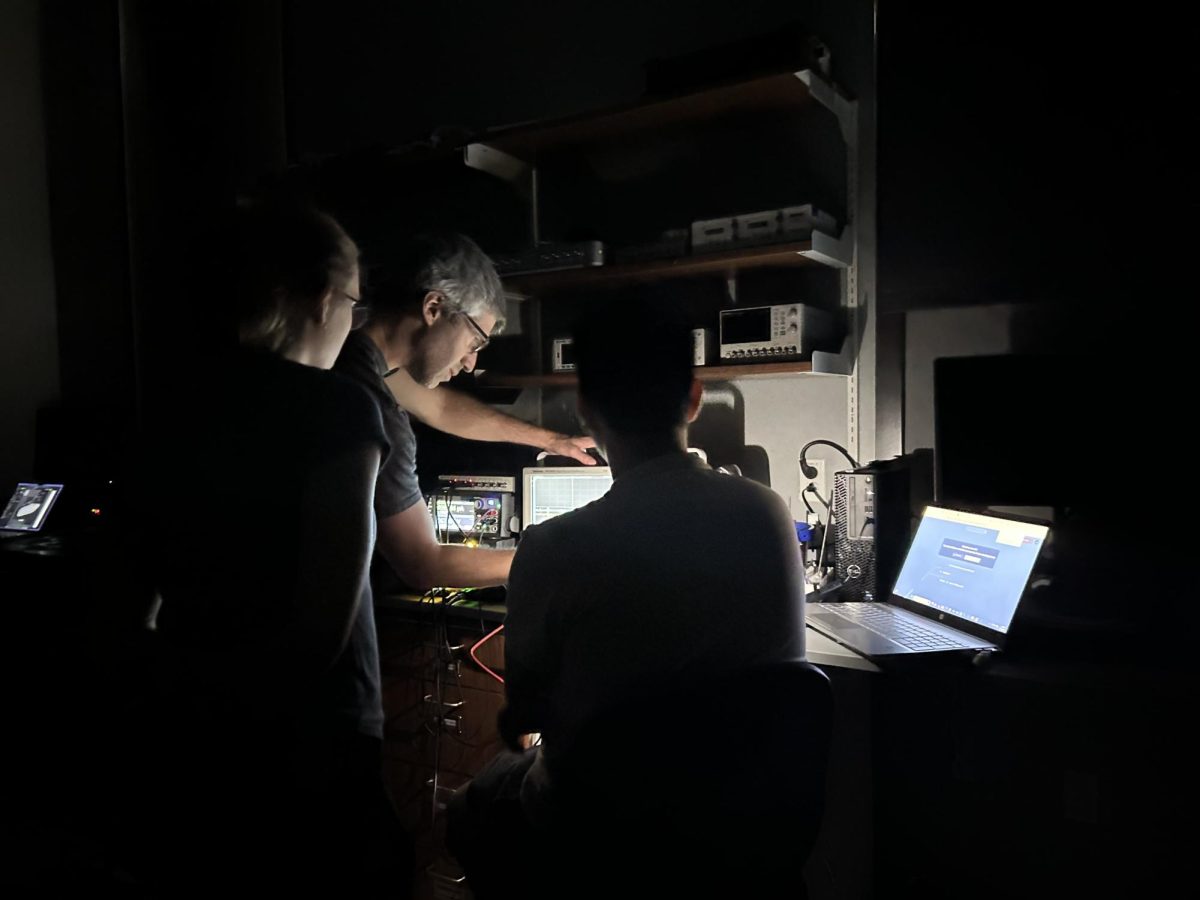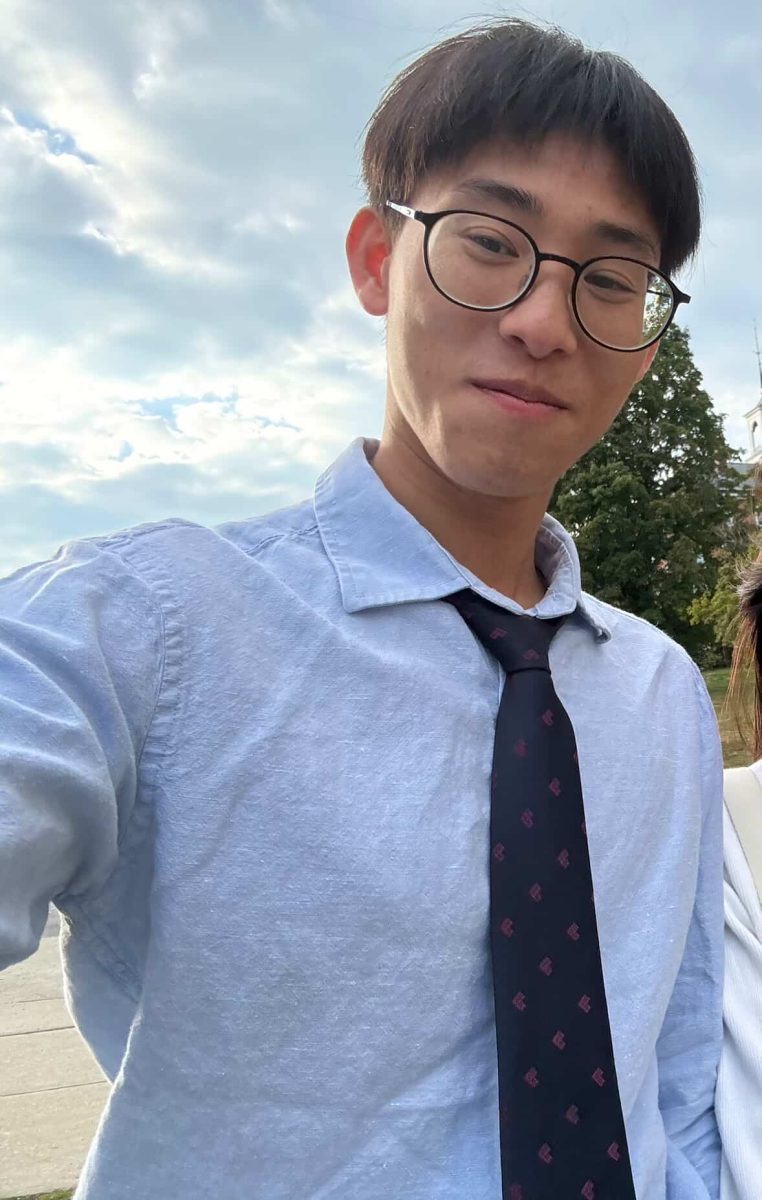
In 2017, Aisha Abdrashitova ’22 – then a student at the Berkshire School – reached out to bestselling author and then-Professor of English at Smith College Ruth Ozeki asking what book she should gift her English teacher, Professor of English Bernie Rhie, as a thank-you. Knowing and sharing Rhie’s love for Ozeki’s award-winning A Tale for the Time Being, Abdrashitova felt Ozeki could offer the best recommendation. Ozeki suggested Norman Fischer’s Experience.
Ozeki, tickled by the student’s request, reached out to Rhie herself and learned that Rhie had indeed enjoyed the gift. The two became friends, and Rhie, having returned to teach at the College after his teaching stint at the Berkshire School, began including Ozeki’s A Tale for the Time Being in his course, ENGL 239: “Zen and the Art of American Literature,” for years, began to invite her as an annual guest speaker.
Ozeki and Rhie initially bonded over their love of literature and shared Buddhist practices. Rhie was familiar with Ozeki’s work. “[Meeting Ozeki] deepened my appreciation for her brilliance,” he said. He was impressed with how Ozeki’s Zen practice informed her writing. “It was clear to me meeting her that she was really a serious practitioner, that she had sat in meditation,” he said.
Last Wednesday, Ozeki, now the Margaret Bundy Scott Distinguished Visiting Professor at the College, read a passage from her most recent book, The Book of Form and Emptiness, to a room full of faculty, students, and Town residents.
“Shhh… Listen!” Ozeki read from the opening of her book. “That’s my book, and it’s talking to you. Can you hear it? It’s okay if you can’t, though. It’s not your fault. Things speak all the time, but if your ears aren’t attuned, you have to learn to listen.”
“I wanted to illustrate that the book really is a character in the book,” Ozeki told the Record in an interview after the reading. “It seemed like people were into it, and they were really listening. That made me happy.”
Ozeki retired from teaching at Smith last spring. During her time off in the fall, she enjoyed the freedom of dedicating herself to writing full time. Ozeki did not expect to return to teaching, but after Rhie invited her to serve as a visting professor, she took the opportunity and has since been reminded of her love for the classroom.
“I came to Williams and started interacting with my group, and it was like being hit with this feeling of, ‘Oh my god, I really love this,’” she said. “I love being in the classroom, I love listening to what students think about literature, and I love reading their writing.”
Ozeki’s course, “Advanced Writing Workshop,” is composed of skilled fiction writers. In addition to teaching the technical and creative aspects of writing, Ozeki said she prioritizes instilling within students the skill of maintaining a commitment to the work of writing, she said. For seniors in the class who might find themselves without structured writing deadlines come September, the skill of self-motivation is particularly imperative to writing, she said.
“They all have great imaginations, and they’ve got plenty to write about — that I’m not worried about,” Ozeki said. “At this point, what emerging writers need to do is really understand who they are as writers, and that means not just in a classroom situation, right? They need to understand how to self-motivate.”
To this end, Ozeki’s course offers its writers flexibility in their work schedules. She expects, however, that by the end of the course, they will have produced a polished portfolio of their work. In doing so, Ozeki hopes the writers will learn to self-manage their writing schedules. “That’s the most important thing — to really be able to understand what it is you need to sustain your writing and then figure out how to get that,” she said.
One of Ozeki’s students, Myla Dengler ’24, said that Ozeki is invested in helping her students build their confidence in their writing. “She cares about all of us as people and believes in our writing,” Dengler wrote in an email to the Record. “I think this class has taught me a lot about the importance of embracing my own writerly voice and trusting my gut when editing.”
Ozeki has found that teaching goes both ways — it not only allows her to foster skills in her students, but it also leads to her own development as a writer, she said. Through teaching, she has come to more consciously understand the tools and maneuvers she employs in her own writing. “I think the consistency of teaching helped me understand what it is that I have in my writer’s toolbox,” Ozeki said.
One of these tools within Ozeki’s writing is her use of adolescent voices as narrators. “Because adolescence was such an urgent, pivotal, and crucial part of my life, I’m drawn to writing in those voices, to explore that experience,” she said. “It’s a way of feeling my way back into that adolescent body, into that adolescent mind and trying to understand what it was that happened to me and how I was able to survive that.”
In reflecting upon her use of the adolescent voice, Ozeki stumbled upon an answer to a broader question: Why write? Ozeki’s writing aids her understanding of both herself and the world around her, she said. While many books seem to be sealed worlds of their own, Ozeki’s books are capacious, infinitely permeable worlds, filled with ideas and experiences pulled from various corners of her life. The fields of reference from which she draws inspiration are broad, spanning traditions such as Shinto and Zen Buddhism, a spiritual practice in which she is a priest; her favorite writers, among them Walter Benjamin, Marcel Proust, and the 13th-century Zen master Dōgen; and news events, including the 2011 Tōhoku earthquake and tsunami, the Great Pacific Garbage Patch, and the 2016 presidential election.
“I’m always testing, allowing the world of the novel to interpenetrate with my world and my interests,” Ozeki said.
Her writing, although fiction, is inextricably linked to her understanding of herself and her experiences, she said. “The whole idea of the Muse dropping into the writer’s head, I’m not really buying that — that’s why I think of writing as more of a dream,” she said. “In the same way that the dream landscape might be completely unfamiliar to you, it’s [still] coming from you, right? It’s coming from your own experience. It’s not divorced from you.”
For Ozeki, the process of writing involves cultivating these dreams and letting them find their way onto paper. In part inspired by her Buddhist practices, this process is more meditative than analytical. “You can’t think it into existence,” she said. “You have to allow these kinds of deeper encoded parts of yourself to speak.”
Ozeki recently achieved Dharma transmission in Zen, according to Rhie. “Not only is she a practitioner, but she’s done enough Zen practice where she can be a teacher to others and students,” Rhie said. “That takes a long time.”
In putting her dreams on paper, Ozeki creates a dialog between herself, her books, and her readers. “[Writing is] both an inner exploration, but it’s also something that you share with the world,” she said. “It’s a way of having a dialogue with the world.”
When Ozeki visited Rhie’s classroom, the pair would discuss how students can each develop a unique relationship with the books they read, which Rhie related to the Buddhist idea of interconnection. “For every single person in the room, there is a different version of A Tale for the Time Being, because each student, each reader in the world, creates their own kind of book as they read it,” Rhie said. The pair plan to host a meditation session for students after spring break.
Now halfway through the semester, Ozeki said she wishes she had more time with her students. “I’m really enjoying [teaching],” she said. “I’m so impressed with the level of engagement and excitement the students bring — it’s contagious.”








